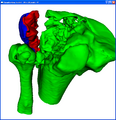Difference between revisions of "2010 Summer Project Week Fracture Classification Brainstorming"
m (moved 2010 Summer Project Week FractureClassification Brainstorming to 2010 Summer Project Week Fracture Classification Brainstorming) |
|||
| (One intermediate revision by the same user not shown) | |||
| Line 9: | Line 9: | ||
==Key Investigators== | ==Key Investigators== | ||
* UMIT: Karl Fritscher | * UMIT: Karl Fritscher | ||
| − | * | + | * BWH: Ron Kikinis |
* Georgia Tech: Peter Karasev | * Georgia Tech: Peter Karasev | ||
* University of Iowa: Vince Magnotta | * University of Iowa: Vince Magnotta | ||
Latest revision as of 18:49, 16 June 2010
Home < 2010 Summer Project Week Fracture Classification Brainstorming
Key Investigators
- UMIT: Karl Fritscher
- BWH: Ron Kikinis
- Georgia Tech: Peter Karasev
- University of Iowa: Vince Magnotta
- Isomics: Curt Lisle
Objective
Fracture classification is of essential importance
- as a treatment guide
- to assist with prognosis
- to speak a common language with others in order to compare results
Unfortunately the interobserver variability concerning the classification of different fractures is rather high [1]. Consequently (semi)-automatic methods to classify fractures according to established fracture classification systems, could be a helpful aid for an objective and consistent classification of fractures.
Approach, Plan
During the project week a first brainstorming session about potential appraoches for (automatic) fracture classification based on geometric surface properties [2] will be discussed.
Progress
This project is still in its planning phase!
References
[1] NO Thomsen, S Overgaard, LH Olsen, H Hansen, and ST Nielsen, Observer variation in the radiographic classification of ankle fractures, Journal of Bone and Joint Surgery - British Volume, Vol 73-B, Issue 4, 676-678
[2] P.A. Karasev, J.G. Malcolm, M. Niethammer, R. Kikinis, A. Tannenbaum. User-Driven 3D Mesh Region Targeting. SPIE Medical Imaging 2010.

